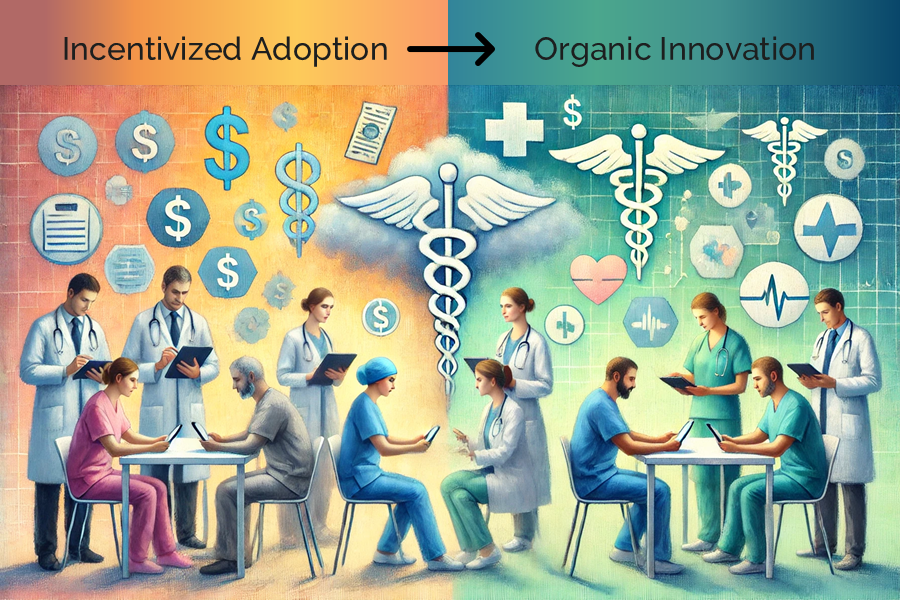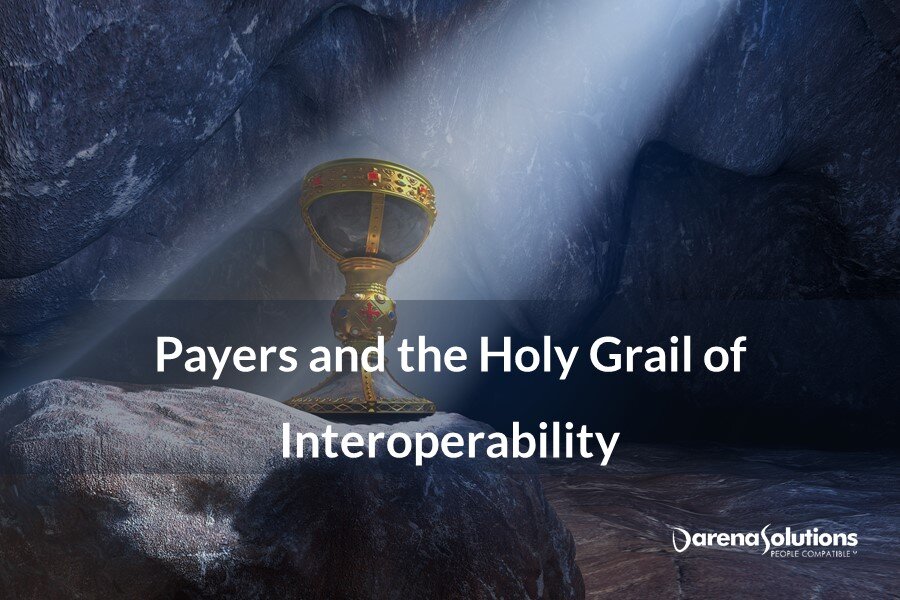Darena Solutions Blog and News
Incentivized Adoption to Organic Innovation: The Rise of Headless EHRs
The EHR landscape is experiencing a shift from EHR adoption driven by Meaningful Use incentives to the organic evolution of headless EHRs. This is great news, but it raises some questions about the effectiveness of the incentives and sustainability of the innovation. Read on to explore some of these questions and join us for a panel discussion for more in-depth analysis.
MeldRx Summer Updates: ONC HTI-1 and More
Our team has been working hard to ensure you are well-prepared for the upcoming ONC deadlines at the end of 2024. Read an overview of the key updates we'll be rolling out this summer, including ONC Endpoint Requirements under HTI-1, MeldRx directory, and app updates.
Consumer-Mediated Exchange in Healthcare
Consumer-mediated exchange allows patients to directly share their health data with providers, payers, and researchers, enhancing data accessibility and addressing interoperability issues. This blog examines the mechanics, challenges, and solutions for implementing consumer-mediated exchange of health information.
HTI-1 Decision Support Interventions (DSI) for EHRs and AI App Developers
ONC’s Health Data, Technology, and Interoperability (HTI-1) final rule was enacted on March 11, 2024, and since then has been the front and center of all news in healthcare IT. A particular section of the HTI-1 rule, Decision Support Intervention (DSI), has been the primary focus. In this blog, we will unpack what DSI is and what it means for EHRs and AI App Developers.
Need (b)(10) to Complete Your Certification Bingo Card?
Are you looking to fast-track your transition to 170.315 (b)(10) certification? Let us simplify your journey to quick (b)(10) compliance and CHPL listing updates.
ChatGPT and FHIR: The Possibilities
With the introduction of the HL7® FHIR® standard, accessing patient health records has become easier than ever before. When FHIR is combined with the power of artificial intelligence language models such as ChatGPT, the results are nothing short of amazing. In this blog, we explore the possibilities of interpreting patient FHIR records with the MeldRx Chat powered by ChatGPT. In the accompanying video, we showcase how patients can receive real-time assistance in understanding complex medical terminologies, test results, and treatment options. We believe that collaboration is the key to driving innovation and advancing healthcare. Join us in the movement towards a more connected and patient-centric healthcare system with ChatGPT and FHIR.
Cures Act: A Patient's Perspective
With the Cures Act deadlines around the corner, the focus has been on “how” to meet the requirements, and not “why”. Let’s not forget that each one of us will be a patient at some point in our lives. When we are the patient, we want Health IT to work for us. We need access to our health data for that and Cures Act makes it possible. This personal experience will make that evident.
Feel the burn of FHIR®? Get closer to the Flame.
The final implementation phase of the most stringent requirements of the Cures Act has already begun and everyone in Healthcare IT can feel the heat of FHIR® rising. No more delays are likely in the enforcement of the ONC and the CMS rule. If you're trying to find the quickest and shortest path to meeting the Cures Act requirements let us show you SMART® approach and how to leverage the power of FHIR.
Liar, Liar, That's not FHIR®
The market for FHIR solutions is quickly heating up. While every solution may have its pros and cons, we have recently seen many announcements and promotions that we felt are misguided representations of FHIR solution's actual capabilities related to meeting regulatory requirements. In this blog, I would like to bring to light some facts, to enable you to make an informed decision.
Interoperability: There is FHIR® at the End of the Tunnel
Over the last decade, billions of American taxpayer dollars have been spent to achieve “interoperability” in healthcare. Has it worked? The answer depends on who you ask. However, everyone agrees that we have a long way to go. Is FHIR® the answer to the interoperability conundrum?
2021: Time for Everyone to Play With FHIR®
As 2020 comes to a close, it is time to reflect back at the year. The COVID challenge we are faced with and drawing upon the lessons learned from it to remind everyone that regardless of the role you play in the healthcare ecosystem (patients, providers, payers, and Health IT vendors), come 2021, you need to start playing with FHIR.
Mirror, Mirror on the Wall, Who’s the FHIRest of Them All?
After the 21st Century Cures Act Final Rule was announced, the healthcare IT marketplace has been inundated with solutions, all claiming to be able to meet or even exceed the compliance requirements. Unfortunately, there is no magic mirror available that can tell you which FHIR solution is the fairest choice for your organization. So, let’s start with some facts and follow a logical path to help you find a solution that not only meets your current needs, but aligns with your future requirements as well.
CCDA TO FHIR® Crosswalk: An Information Blocking Insurance
Updating the CCDAs might be the easiest way to share USCDI data and avoid the $1,000,000 penalty under information blocking regulation. However, it might not be the best way as Cures Act ultimately requires you to make the same data available through a FHIR® API. In this blog, we will drill a little deeper on how making this data available through a FHIR® API is a better long-term strategy than simply sharing an updated CCDA.
Am I an Information Blocker: A $1,000,000 Question
On October 29th, 2020, ONC announced an Interim Final Rule to extend compliance for some of the provisions including Information Blocking due to the COVID-19 pandemic. In this blog, we discuss what changed in the Interim Final Rule, how it impacts providers and EHR vendors, and solutions for meeting the Information Blocking requirements.
Personal FHIR® Records - A Safety Deposit Box or Interest-Bearing Account?
It can be hard to explain how a Personal FHIR® Record differs from a Personal Health Record. But in reality there is a key difference in the interoperability of the two record types. That difference is what makes a PFR special, and why every patient should have a PFR.
Get Ready for Cures Act With Azure API For FHIR®
There is a lot of confusion on what exactly the 21st Century Cures Act requires and includes. We help break down the law and demonstrate how we are helping our clients meet the requirements using Azure API for FHIR®.
Why FHIR® Matters for Patients?
More than any other stakeholder it is patients who stand to gain the most from FHIR enabled semantic interoperability. In this blog, we outline the major benefits that patients can expect to gain from increased interoperability.
FHIR®: What’s in it for Providers?
There is a lot of buzz surrounding the concept of interoperability and FHIR®, but what do healthcare providers get out of it? We delve into a variety of benefits that providers organizations (big and small) can expect to see when they decide to adopt FHIR®.
Epic's Letter To HHS: Facts vs Fiction
Last year at HIMSS, ONC announced a proposed rule pertaining to some provisions of the 21st Century Cure’s Act, which included some new certification criteria that all EHR vendors will need to support going forward. Yesterday evening, CNBC released an article sharing that Epic’s CEO, Judy Faulkner is urging hospital executives to oppose this rule. Epic has confirmed this and that they have sent an email to HHS Secretary Alex Azar, which has been signed by other “healthcare CEOs.” This is a very disappointing action by Epic, trying to misrepresent the proposed rule. Let’s winnow the fiction from the facts to understand what is going on here.
Payers and the Holy Grail of Interoperability
Healthcare payers stand to benefit from increased interoperability.. We explore why proposed rule CMS-9115 could mean a lot for payers in 2020.




















